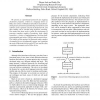Free Online Productivity Tools
i2Speak
i2Symbol
i2OCR
iTex2Img
iWeb2Print
iWeb2Shot
i2Type
iPdf2Split
iPdf2Merge
i2Bopomofo
i2Arabic
i2Style
i2Image
i2PDF
iLatex2Rtf
Sci2ools
112
click to vote
CODES
1994
IEEE
1994
IEEE
Towards a declarative framework for hardware-software codesign
We present an experimental framework for mapping declarative programs, written in a language known as Ruby, into various combinations of hardware and software. Strategies for parametrised partitioning into hardware and software can be captured concisely in this framework, and their validity can be checked using algebraic reasoning. The method has been used to guide the development of prototype compilers capable of producing, from a Ruby expression, a variety of implementations involving fieldprogrammable gate arrays (FPGAs) and microprocessors. The viability of this approach is illustrated using a number of examples for two reconfigurable systems, one containing an array of Algotronix devices and a PC host, and the other containing a transputer and a Xilinx device.
CODES 1994 | Declarative Programs | Fieldprogrammable Gate Arrays | Parametrised Partitioning | Software Engineering |
| Added | 08 Aug 2010 |
| Updated | 08 Aug 2010 |
| Type | Conference |
| Year | 1994 |
| Where | CODES |
| Authors | Wayne Luk, Teddy Wu |
Comments (0)

